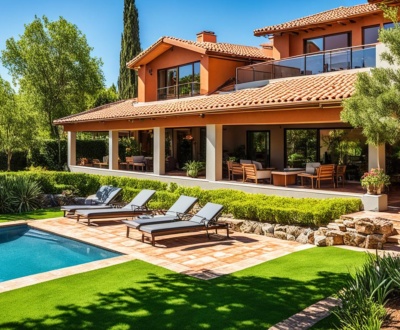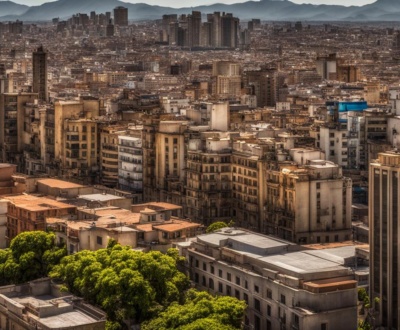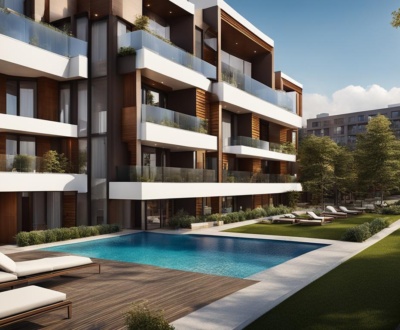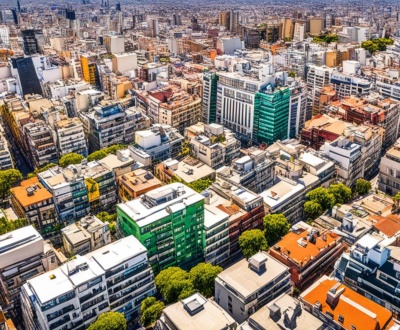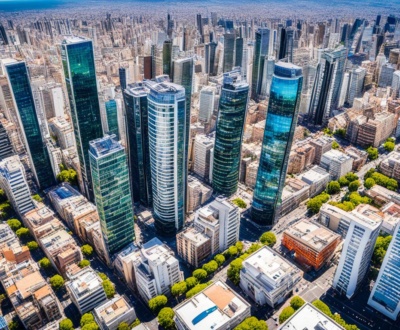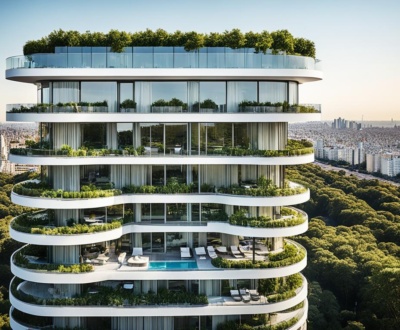Are you considering investing in Buenos Aires real estate? With its vibrant culture, rich history, and thriving property market, Buenos Aires offers a unique opportunity for both local and international buyers. Whether you’re looking to buy property in Buenos Aires for personal use or as an investment, this guide provides valuable insights and tips to help you navigate the buying process successfully.
In Buenos Aires, you’ll find a wide range of real estate options, from luxurious homes in exclusive neighborhoods to affordable properties for first-time buyers. The Buenos Aires property market is known for its diverse selection of properties, offering something for everyone’s taste and budget. Real estate agencies in Buenos Aires can provide you with access to a vast array of properties for sale in Buenos Aires, ensuring you find the perfect fit for your needs.
If you’re interested in luxury homes in Buenos Aires, you’ll find breathtaking properties that boast impeccable design, high-end finishes, and stunning views. These properties cater to those seeking the ultimate in comfort, privacy, and sophistication.
Investing in Buenos Aires real estate can be a lucrative venture, with the potential for capital appreciation and rental income. The Buenos Aires property market has shown resilience, even during uncertain economic times, making it an attractive option for investors looking to diversify their portfolios.
When it comes to Buenos Aires real estate prices, it’s important to consider various factors that can influence the value of a property, such as location, size, amenities, and market trends. Working with a reputable real estate agency can provide you with accurate and up-to-date Buenos Aires real estate listings, ensuring you have access to the most relevant information to make informed decisions.
Whether you’re looking to buy property in Buenos Aires or simply explore the exciting real estate market, this guide will equip you with the knowledge and resources you need for a successful real estate journey. Get ready to embark on a rewarding adventure in the Buenos Aires property market and make your dreams of owning a piece of this vibrant city a reality.
Searching for the ideal property in Buenos Aires
When embarking on a Buenos Aires property search, several key factors should be considered to find the ideal property. Location is a crucial aspect to prioritize, and proximity to main avenues can greatly enhance convenience and accessibility. Santa Fe and Alvear are two main avenues in Buenos Aires that offer easy access to the city’s amenities and transportation networks.
Safety is paramount when choosing a neighborhood in Buenos Aires. Recoleta, Palermo, Puerto Madero, and Barrio Norte are highly recommended areas that boast a reputation for their security and tranquility.
Examining the building status of a property is essential to ensure its structural soundness and compliance with regulations. By researching the building’s history, maintenance, and potential upcoming urban developments, buyers can make informed decisions about their investment.
Clear title ownership is another crucial aspect to investigate before finalizing a property purchase. Verifying the property’s legal status and title ownership helps avoid any future complications or disputes. Buenos Aires Habitat provides comprehensive information about properties, including their price, selling conditions, commission details, home association fees, and the cost of the Municipal Tax.
With these considerations in mind, prospective buyers can navigate their Buenos Aires property search with confidence, finding their ideal property that meets their needs and preferences.
| Factors to Consider | Recommended Options |
|---|---|
| Main Avenues | Santa Fe, Alvear |
| Safety | Recoleta, Palermo, Puerto Madero, Barrio Norte |
| Building Status | Research building history, maintenance, upcoming developments |
| Property Title Ownership | Verify clear title ownership, legal status |
Making the offer: Reservation
After finding the desired property, the next step is to make an offer and proceed with the reservation process. The offer, known as the Reservation, outlines the terms and conditions of the purchase offer, including price, transaction terms, and payment terms. A good faith deposit of approximately 1% of the ownership value is required during the Reservation process. This deposit credits the buyer as a serious claimant and secures priority over the ownership. It’s important to obtain legal advice when negotiating the wording of the Reservation and ensure the terms of the Contract of Purchase and Sale are agreed upon by both parties.
Reservation Process
The reservation process is an essential step in securing the property offer and moving forward with the purchase. It involves several key steps:
- Submit the offer: Prepare the Reservation document, including the agreed-upon terms and conditions of the purchase offer.
- Review by the seller: The seller will review the offer and negotiate any necessary changes or contingencies.
- Good faith deposit: Once the offer is accepted, the buyer is required to pay a good faith deposit, typically amounting to 1% of the ownership value.
- Legal advice: It’s crucial to seek guidance from a qualified lawyer to ensure the Reservation document protects the buyer’s interests and complies with legal requirements.
- Contract of Purchase and Sale: The Reservation lays the foundation for the subsequent contract negotiations and drafting. It’s essential to ensure that the terms agreed upon in the Reservation are clearly reflected in the Contract of Purchase and Sale.
By following these steps, both the buyer and the seller can proceed with confidence in the purchase process, knowing that the Reservation accurately reflects their agreement and safeguards their interests.
Good Faith Deposit
The good faith deposit is a crucial element of the Reservation process. It serves as a demonstration of the buyer’s commitment to purchasing the property and provides them with priority over other potential buyers. Here are some key details about the good faith deposit:
- Amount: The deposit typically amounts to approximately 1% of the ownership value.
- Purpose: The deposit demonstrates the buyer’s serious intent to proceed with the transaction and protects their claim to the property during the negotiation process.
- Refundability: The deposit is usually refundable in specific circumstances, such as if the seller breaches the terms of the Reservation or if legal issues arise during the due diligence process.
- Applied to purchase: If the sale proceeds as planned, the good faith deposit is credited towards the purchase price, reducing the buyer’s total payment.
It’s important to note that the specific terms and conditions regarding the good faith deposit may vary depending on the jurisdiction and individual agreements between the buyer and seller. Consulting with a legal professional experienced in real estate transactions is crucial to ensure compliance with local regulations and protect the buyer’s interests.
| Advantages of the Good Faith Deposit | Disadvantages of the Good Faith Deposit |
|---|---|
|
|
The Contract of Purchase and Sale
Once you have found your dream property in Buenos Aires and made an offer, it’s time to formalize the transaction with a contract. The Contract of Purchase and Sale is a legally binding agreement that outlines the terms and conditions of the property sale between the buyer and seller.
This contract ensures that both parties are committed to completing the transaction and sets out the obligations and responsibilities of each party. It includes important details such as the property sale price, payment terms, and any additional conditions agreed upon by both parties.
One of the key elements of the contract is the down payment, which is typically between 30% and 50% of the property value. This down payment serves as a commitment from the buyer and provides assurance to the seller that the buyer is serious about the purchase.
The Contract of Purchase and Sale does not transfer ownership rights immediately. Instead, it compels the seller to transfer the property rights to the buyer on a specified date, usually after all the necessary conditions have been met.
To ensure the legality and validity of the contract, it is prepared by the lawyers representing both parties. Once the contract is finalized and signed, it is executed before a Public Notary, who oversees the transaction and ensures all legal requirements are met.
Title Deed (Escritura): ownership
The Title Deed is the final step in transferring property ownership. It guarantees the legality and transparency of the transaction, providing peace of mind to both buyers and sellers. With the Title Deed, the ownership rights and possession of the property are officially transferred from the seller to the buyer.
Before executing the Title Deed, a Public Notary conducts due diligence on the property. This involves clearing the title and obtaining a certificate from the Real Estate Registry to block any encumbrances. This ensures that the property is free of any debts or legal issues that may impact the ownership transfer.
Once all necessary checks and verifications are complete, the Title Deed is signed before the Public Notary. It signifies the transfer of ownership rights from the seller to the buyer. Along with the Title Deed, the possession of the property is also handed over to the buyer, solidifying their ownership.
To validate the buyer’s ownership rights against third parties, the buyer’s ownership information is registered in the Real Estate Registry. This serves as an official record that confirms their legal ownership of the property.
| Benefits of the Title Deed: |
|---|
| 1. Legal and transparent property transfer |
| 2. Peace of mind for both buyers and sellers |
| 3. Cleared title and no encumbrances |
| 4. Official transfer of ownership rights |
| 5. Possession of the property is received by the buyer |
Can you purchase and own a property in Argentina as a foreigner?
Foreigners have the right to purchase and own property in Argentina, as stated by the Argentine Constitution. However, there are certain restrictions on land acquisition by foreigners that need to be considered. The main restrictions apply to rural land and land in border security zones. Foreigners are prohibited from owning rural land unless they meet specific exceptions, such as being a foreign resident, having Argentine children, or being married or living with an Argentine for a certain period of time. In addition to these restrictions, foreigners are required to have a CDI (Clave de Identificación), which is a tax ID number, to purchase property in Argentina.
The CDI is a crucial requirement for property ownership and serves as a unique identifier for individuals in tax-related matters. It is obtained through the Argentine Federal Administration of Public Revenues (AFIP). To apply for a CDI, foreigners need to submit the necessary documents and undergo the registration process with AFIP. This tax ID number is essential for any financial transactions, including the purchase of real estate. It ensures that foreigners comply with tax obligations and contributes to the transparency and legality of property ownership.
It’s important to note that owning property in Argentina as a foreigner does not automatically grant residency or citizenship. These are separate processes with their own requirements and procedures.
In addition to the CDI, foreigners interested in purchasing rural land in Argentina need to obtain a special certificate from the National Rural Land Registry. This certificate ensures that the land purchase is in compliance with the regulations and restrictions imposed on rural land ownership by foreigners.
Restrictions on Land Purchase by Foreigners in Argentina:
| Type of Land | Restrictions |
|---|---|
| Rural Land | Foreign ownership prohibited, unless meeting specific exceptions |
| Land in Border Security Zones | Foreign ownership restricted |
It is essential for foreigners interested in purchasing property in Argentina to familiarize themselves with the land acquisition regulations and seek legal advice to ensure a smooth and compliant transaction. By adhering to the regulations and obtaining the necessary documentation, foreigners can confidently pursue property ownership in Argentina.
Can you become a resident in Argentina by owning a property?
Owning a property in Argentina does not grant automatic residency or citizenship. However, foreigners can apply for temporary residence as investors by presenting an investment project to the Dirección Nacional de Migraciones. The investment must be a minimum of 1,500,000 Argentine pesos, and proof of legal funds and their source is required. The Ministry of Production assesses the project’s viability and grants temporary residency with a mandatory investment timeline. Temporary residency can be renewed for up to three years.
To become a resident in Argentina by owning a property, foreigners need to:
- Present an investment project to the Dirección Nacional de Migraciones
- Invest a minimum of 1,500,000 Argentine pesos
- Provide proof of legal funds and their source
- Obtain a favorable assessment from the Ministry of Production
- Adhere to a mandatory investment timeline
- Renew temporary residency for up to three years
In this way, foreigners can enjoy the benefits of residency in Argentina while actively participating in the country’s economy through their investment projects.
Becoming a Resident in Argentina: Key Steps
- Investment Project Presentation: Prepare a comprehensive investment project, including details of the proposed investment, its economic impact, and how it aligns with the country’s development goals.
- Minimum Investment Requirement: The investment must meet the minimum requirement of 1,500,000 Argentine pesos, demonstrating a significant commitment to the country’s economy.
- Legal Fund Documentation: Provide clear and verifiable documentation of the legal origin and source of the investment funds, ensuring transparency and compliance with anti-money laundering regulations.
- Ministry of Production Evaluation: The Ministry of Production evaluates the viability of the investment project, considering its potential economic benefits, job creation, and contribution to national growth.
- Temporary Residency Grant: If the investment project is approved, the Ministry of Production grants temporary residency, acknowledging the investor’s commitment to Argentina’s development.
- Investment Timeline Compliance: Investors must adhere to a mandatory investment timeline, fulfilling the agreed-upon milestones and demonstrating ongoing participation in the investment project.
- Residency Renewal: Temporary residency can be renewed for up to three years, providing continuity and stability for investors as they contribute to Argentina’s economic growth.
By following these steps, foreigners can fulfill the requirements to become residents in Argentina through their property investments, enjoying the social, cultural, and economic benefits of being part of Argentina’s vibrant community.

| Benefits of Obtaining Temporary Residency as an Investor in Argentina | Challenges |
|---|---|
|
|
Should you buy or rent in Argentina?
The decision to buy or rent property in Argentina depends on individual circumstances and your long-term plans. Consider factors such as your desired length of stay, potential for retirement, and overall financial goals. Let’s explore the advantages and considerations of both options.
Buying Property in Argentina
If you plan to use the property for at least three months a year or potentially retire in Argentina, buying property can be a wise choice. Here are some reasons to consider:
- Stability: Owning property provides stability and a sense of belonging, allowing you to establish roots in the community.
- Investment Opportunities: Buying property in Argentina can be a valuable long-term investment. The real estate market has shown significant growth, providing potential for capital appreciation.
- Financing Options: While financing options may be limited for non-residents, there are opportunities available for Argentine citizens and residents.
“Owning property provides stability and a sense of belonging.”
However, it’s important to note that there may be more advantageous investment opportunities elsewhere. It’s essential to consider the potential return on investment and compare it to other investment options. Seek professional advice to evaluate the financial viability of buying property in Argentina.
Renting Property in Argentina
Renting property may be a more suitable option if you plan to use the property less than two months a year. Here’s why renting may be the right choice:
- Flexibility: Renting provides you with the flexibility to change locations or explore different neighborhoods without the long-term commitment of property ownership.
- Lower Financial Obligations: Renting typically involves lower upfront costs compared to buying. This can be beneficial if you only plan to stay for short periods.
- Property Maintenance: As a renter, you are relieved of the responsibility for property maintenance and repairs, which can be time-consuming and costly.
Financial Considerations
When considering buying or renting property in Argentina, it’s important to be aware of the financial aspects involved. Property taxes in Argentina are generally manageable, typically around 1,500 pesos per month. However, additional expenses such as maintenance, insurance, and association fees should also be considered when evaluating the financial feasibility of buying property.
Furthermore, financing options may be more limited for non-residents, making it challenging to secure a mortgage. On the other hand, rental costs can vary depending on the location, size, and condition of the property. It’s advisable to research rental rates in your desired area to ensure it aligns with your budget.
Ultimately, the decision to buy or rent property in Argentina depends on your personal circumstances, financial goals, and long-term plans. Consider the stability, investment potential, and financial obligations associated with each option, and make an informed decision that aligns with your needs and aspirations.
| Aspects | Buying | Renting |
|---|---|---|
| Stability | Provides stability and a sense of belonging | Offers flexibility and freedom to change locations |
| Investment Opportunities | Potential for long-term capital appreciation | No potential for capital appreciation |
| Financing Options | Limited options for non-residents | No financing requirements |
| Financial Obligations | Property taxes, maintenance costs, insurance | Rental fees, utilities |
| Flexibility | Limited flexibility due to long-term commitment | Greater flexibility to change locations |
| Property Maintenance | Responsible for property maintenance and repairs | Landlord responsible for maintenance |
How is the Real Estate Market in Argentina?
The real estate market in Argentina is experiencing significant growth in purchase and sale transactions, particularly in Buenos Aires. There is a high demand for property purchases, resulting in a surge in mortgage-related deeds. The average value of property transactions has also shown substantial growth, indicating a thriving market.
However, the rental market in Argentina is facing challenges. There is a shortage of available properties, leading to significant price increases. This can make it difficult for individuals looking to rent a property in Buenos Aires.
Property prices in Buenos Aires vary depending on the type of property and its location. Certain areas, such as Recoleta and Palermo, tend to have higher average prices compared to other neighborhoods. The prices of apartments per square meter range from $1,250 to $1,631, presenting a wide range of options for potential buyers.
To give you a better understanding of the real estate market in Argentina, let’s take a look at a comparison table showcasing the average property prices in different areas of Buenos Aires:
| Neighborhood | Average Property Price (per square meter) |
|---|---|
| Recoleta | $1,500 |
| Palermo | $1,400 |
| Belgrano | $1,200 |
| San Telmo | $1,100 |
These average prices give you an idea of the cost of properties in different neighborhoods. It’s essential to consider your budget and preferences when exploring the real estate market in Buenos Aires.
The real estate market in Argentina is constantly evolving, influenced by various factors such as economic conditions and market trends. Staying informed about the latest developments can help you make informed decisions when it comes to buying or selling property in Argentina.
By staying informed and understanding the current trends in the real estate market, you can make smart investment decisions and navigate the Argentine market with confidence.
Buenos Aires Real Estate Market Trends
Foreign investors are showing a growing interest in the Buenos Aires real estate market. With its vibrant culture, excellent infrastructure, and attractive property prices, Buenos Aires has become a preferred destination for international buyers.
However, it is important to be aware of the potential risks and challenges in the market. While there has been a surge in activity and increased demand for property purchases, it’s essential to carefully navigate the real estate landscape to avoid potential pitfalls.
Reselling property and repatriating funds can be challenging for foreign investors. It is crucial to consider factors such as market conditions, legal requirements, and tax implications before making any investment decisions.
Foreign investors should approach the Buenos Aires real estate market with caution and seek expert advice to mitigate risks and maximize returns. Working with professionals who have in-depth knowledge of the local market can provide valuable insights and ensure a smooth investment process.
“In the property market, understanding the current trends is crucial for making informed investment decisions and staying ahead of the game.”
“Attracting foreigners with its unique charm and potential, Buenos Aires offers promising opportunities in the real estate sector. However, it is important to approach the market with a strategic mindset, considering both the rewards and risks involved.”
Property Market Trends
Here are some notable property market trends in Buenos Aires:
- Increasing demand for residential and commercial properties
- Rising property prices in prime locations
- Growing interest in luxury properties and penthouses
- Renovation and restoration projects gaining popularity
- Expansion of co-working spaces and shared offices
Foreign Investor Interest
Buenos Aires has seen a significant influx of foreign investors, enticed by the city’s potential for high returns and attractive investment opportunities. The favorable exchange rate, stable economy, and diverse property options have made Buenos Aires an appealing choice for international buyers.
Risks in the Market
While the Buenos Aires real estate market offers lucrative prospects, it is essential to be aware of the potential risks involved. Some of the key risks include:
- Market volatility and fluctuating property prices
- Legal complexities and bureaucratic processes
- Uncertainty regarding property rights and regulations
- Challenges in reselling properties
- Currency exchange fluctuations
“Careful consideration of market trends and potential risks is crucial for foreign investors looking to capitalize on the opportunities in the Buenos Aires real estate market.”

Buying real estate in Buenos Aires
Buying property in Buenos Aires can be an exciting endeavor, but it also comes with its challenges. One of the main obstacles that buyers face is a lack of reliable and up-to-date information. Without access to trustworthy resources, navigating the property buying process can be overwhelming and risky.
Fortunately, TheLatinvestor has developed a comprehensive property pack that provides buyers with all the necessary information they need to make informed decisions. The property pack includes reliable data on property listings, pricing trends, legal requirements, and tax considerations. By utilizing this resource, buyers can gain a clear understanding of the market and confidently navigate the property buying process.
The property pack also includes a list of trusted contacts, including real estate agents, lawyers, and financial advisors, who can provide expert guidance throughout the buying journey. These professionals have extensive knowledge of the local market and can offer valuable insights and assistance to ensure a smooth and successful transaction.
Furthermore, the property pack includes detailed information on taxes associated with purchasing property in Buenos Aires. Understanding the tax implications is crucial when budgeting for your investment and avoiding any surprises down the line. The property pack provides clarity on the various taxes involved, including transfer taxes, stamp duties, and ongoing property taxes.
When buying real estate in Buenos Aires, having reliable information is key. The property pack offered by TheLatinvestor is a valuable tool that provides buyers with the knowledge and resources needed to make informed decisions, connect with trustworthy professionals, and navigate the property buying process with confidence.
Property Prices in Buenos Aires
When considering purchasing property in Buenos Aires, it’s important to understand the property prices and market fluctuations. The average price of apartments per square meter ranges from $1,250 to $1,631, depending on the type of property and location. However, it’s crucial to note that the Buenos Aires property market has seen fluctuations in recent years, with some areas experiencing price decreases.
Staying updated on market trends is essential for making informed decisions and maximizing investment potential. It’s advisable to seek the guidance of real estate professionals who can provide expert advice and insights into property prices in Buenos Aires. They can help you navigate the market fluctuations and find the best opportunities that align with your budget and investment goals.
Whether you’re looking for a luxury apartment in a premium location or a more affordable option, understanding the current property prices is crucial for a successful purchase. By staying informed and seeking professional guidance, you can make informed decisions and capitalize on the opportunities in the dynamic Buenos Aires property market.
More from our blog
See all postsRecent Posts
- Argentina Property Management: Expert Care & Services February 2, 2024
- Understanding Argentina Real Estate Law Essentials February 2, 2024
- Argentina Luxury Apartments: Upscale Living February 1, 2024


